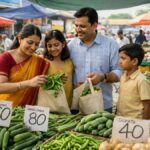Natural Farming Summit 2025 is set to begin today in Coimbatore, with Prime Minister Narendra Modi scheduled to inaugurate the event. The summit, focused on transforming the agricultural landscape of South India, aims to accelerate the adoption of natural, chemical-free and regenerative farming practices across Tamil Nadu, Karnataka, Andhra Pradesh, Kerala and Telangana.
Organised jointly by the Ministry of Agriculture, NITI Aayog, and leading natural farming organisations, the summit will bring together farmers, agricultural scientists, state government officials, FPOs (Farmer Producer Organisations), research institutions and sustainability experts.
The event is expected to see participation from over 10,000 farmers, making it one of the largest natural-farming gatherings in South India. According to the Ministry, the summit will play a “historic role” in encouraging farmers to reduce dependence on fertilisers and pesticides and embrace low-cost, high-yield natural techniques.
A Landmark Event for Sustainable Farming in South India
The South India Natural Farming Summit 2025 comes at a time when the region is grappling with rising input costs, erratic monsoons, soil degradation and increasing demands for chemical-free produce.
The Agriculture Ministry says the summit aligns with the government’s nationwide mission to promote:
- Zero Budget Natural Farming (ZBNF)
- Regenerative agriculture
- Indigenous cow-based farming
- Soil-health restoration
- Water conservation
- Climate-resilient cropping patterns
An official statement from the Ministry noted that natural farming ensures “cost reduction, increased soil fertility and safer food for consumers.”
Source: https://www.thehindu.com/news/national/tamil-nadu/natural-farming-initiatives-india
What Will Happen at the Summit?
The three-day summit (19–21 November 2025) includes:
Technical Workshops
Farmers will receive practical training on:
- Jeevamrutham preparation
- Natural pest repellents
- Mulching and moisture retention
- Multi-layer cropping
- Indigenous seeds and crop diversification
Live Demonstrations
Model plots will demonstrate natural farming systems that require:
- 70–90% less water
- Zero chemical inputs
- Low operating cost
- High resistance to climate fluctuations
Farmer-to-Farmer Knowledge Exchange
Experts from Andhra Pradesh and Karnataka, where natural farming adoption is growing rapidly, will share successful case studies.
Policies & Schemes Discussion
Officials will address farmers on:
- PM-PRANAM scheme
- Natural Farming Corridor development
- Organic cluster development
- Soil health card integration
Marketplace & Buyer Interactions
Retailers, exporters and FPOs will explore direct procurement of natural produce.
Why PM Modi Is Personally Inaugurating the Event
Prime Minister Modi has been a vocal supporter of natural and chemical-free agriculture. Since 2022, he has repeatedly emphasised the need to shift farmers from high-input farming to more sustainable and profitable systems.
In multiple speeches, he described natural farming as:
“A path toward healthy soil, healthy food and healthy future generations.”
The government aims to convert at least one crore (10 million) farmers to natural farming practices by 2030. By inaugurating the summit, PM Modi aims to send a strong message of central support for South India’s farming community.
Government Initiative: https://pib.gov.in/PressReleasePage.aspx?PRID=natural-farming-india
South India’s Rising Shift to Sustainable Farming
States in South India have emerged as important centres of natural farming:
Tamil Nadu
TN government has launched natural farming clusters in Coimbatore, Erode, Salem and Thanjavur.
Andhra Pradesh
AP is a global case study in natural farming adoption, with over 6 lakh farmers practising ZBNF.
Karnataka
Karnataka already has strong millet-based and organic farming systems in districts like Mandya and Chikkamagaluru.
Kerala
Kerala’s “Jaiva Keralam” programme is pushing organic agriculture across the state.
These initiatives show South India’s readiness to scale natural farming practices to millions of farmers.
Why Natural Farming Is Being Promoted
Experts highlight several advantages:
1. Cost Savings
Farmers spend up to 80% less on inputs.
2. Higher Profit Margins
Natural produce fetches premium prices in urban markets.
3. Soil Health Improvement
Microbial activity increases, boosting fertility.
4. Climate Resilience
Crops withstand heatwaves, droughts and pests better.
5. Water Conservation
Natural farming methods use minimal irrigation.
6. Healthier Food
Chemical-free crops meet rising consumer demand for safe food.
According to studies by agricultural universities, natural farming can reduce crop failures and improve long-term sustainability.
Research Link:
https://icar.org.in/natural-farming-research-india
Conclusion
The Natural Farming Summit 2025 in Coimbatore is expected to become a turning point in South India’s agricultural future. With Prime Minister Modi inaugurating the event, the government aims to reinforce national commitment to chemical-free, sustainable and farmer-centric agriculture.
The three-day summit is not only a platform for learning but a movement toward an environmentally resilient and economically sustainable farming system. As India faces climate challenges and rising input costs, natural farming offers a path of hope, strength and self-reliance for millions of farmers.
Stay tuned for more of the latest updates Huffindia.com


























